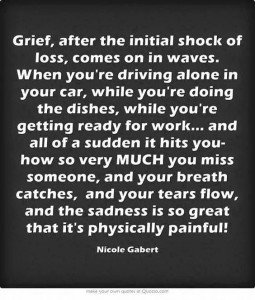
This quote perfectly describes the grief journey. It demonstrates an continued journey, that doesn’t have an end. Our grief journey is ongoing; we will not stop loving or missing the person we lost.  While we will get to a point where we are able to integrate this loss into our lives, we will still have days filled with sadness. We often associate these days as a step back in our journey. They aren’t a step back. They are reminders of the love we had for the person we lost. I often talk about managing expectations. Managing the expectations we have for others is important, but it is essential to manage the expectations we have for ourselves. When we expect to reach a point where the sad days disappear, we are setting ourselves up for failure. When we think we aren’t grieving “the right way” we become self critical. Criticism leads to shame, shame leads to isolation, and isolation can lead to depression. Don’t be critical of yourself and how you are grieving. Know that the grief journey is ongoing, and like the ocean, there will always be waves. Embrace the waves, as they are a part of the journey.
While we will get to a point where we are able to integrate this loss into our lives, we will still have days filled with sadness. We often associate these days as a step back in our journey. They aren’t a step back. They are reminders of the love we had for the person we lost. I often talk about managing expectations. Managing the expectations we have for others is important, but it is essential to manage the expectations we have for ourselves. When we expect to reach a point where the sad days disappear, we are setting ourselves up for failure. When we think we aren’t grieving “the right way” we become self critical. Criticism leads to shame, shame leads to isolation, and isolation can lead to depression. Don’t be critical of yourself and how you are grieving. Know that the grief journey is ongoing, and like the ocean, there will always be waves. Embrace the waves, as they are a part of the journey.




I’ll be honest and say that I am angry that my boyfriend put me in a situation to be on a never-ending grief journey. I will never be able to watch a movie or listen to music without the fear of triggers setting me off into a 2-hour inconsolable crying session. Random things everywhere remind me of him. I know the sadness will never disappear but I hope it will diminish over time, because it’s unbearable at times.
Grief is hard work, but it does “get softer” with that work. It has been said that though most of our pain is in dealing with their absence, a great deal of the most intense pain comes from unfinished emotional business. Journal your thoughts and feel those emotions. Write him a letter telling him what you are angry about, how very much you loved him and miss him – maybe even visit his grave site and read it out loud to him. Or read it out loud to a picture of him in a safe and quiet place. Those thoughts and feelings need to be expressed. Grieve with intention; there will be moments (special days, holidays, birthdays, anniversaries) that will always be tough – but not as tough as right now. Breathe, take care of you and work at the grief. Read, join a group of others actively mourning loss, do something in his memory. Grow, live well. You loved deeply; you will grieve deeply. Hope this helps!
This article is right on target. Having lost my son to suicide 6 years ago, I can definitely say that the sad days have not disappeared – I will never get over the loss but I am learning to live with it.
http://www.missingmyangel.online
The waves were incessant in the beginning after losing my 24 year old son almost 5 years ago. They slowly tapered off over the years. Last year’s anniversary date (May 15th) was the easiest time I’d had getting through his day of death. Thought I was going to be putting the worst of the grief behind me, until 3 days ago. I was knocked off my feet by a tsunami wave of pain that came out of nowhere. Suddenly, every cell in my body was reliving the horrible day that I received the news and all the raw emotion that came with it. I had vivid, exact recall of that time and all the events of the first days and weeks following. I was transported right back to the worst period of my life. So I now have a very good grasp of the fact that this event is embedded deep in the very fabric of my being and still has the ability to blindside me at any given moment.